Sufjan Stevens makes a grand stand at the Hollywood Bowl
Steven Mirkin on
0

“I’ve spent a year-and-a-half singing about death,” Sufjan Stevens told the audience Sunday night at the sold-out Hollywood Bowl. “Tonight, I want to sing about life.”
But Stevens, whose taste for ambitious, overarching projects is both a strength and weakness, is not content with just singing. His Bowl debut (part of KCRW’s World Festival) was an uproariously colorful, daffily theatrical, soulfully uplifting spectacle — a fluorescent-colored, all-singing all-dancing, lushly melodic celebration welcoming everyone to “the holy mothership of Los Angeles.”
The phrase “holy mothership” should give you a sense of what Stevens was after — a combination of his ardent faith with George Clinton’s showmanship. That the crowd walked out of the Bowl in a cloud of good vibes is a measure of how much he succeeded.
||| Photos by Carl Pocket
Where his previous tour, promoting the black crepe beauty of “Carrie & Lowell” (perhaps the most mortality-haunted album since the Eels’ “Electro-Shock Blues”) was an intimate, chamber-pop affair, the current show is scaled for amphitheaters and festivals. While the arrangements are still smartly ornate, with horns, keyboards and vocals meshing into ravishing melodies, beats — both live and electronic — make their way to the front, giving the songs a hefty, kinetic energy. So “Seven Swans” builds to a glorious prog-rock crescendo, as over-the-top and swooning as Pink Floyd, with Stevens and his background singers and dancers sprouting wings.
“Come On Feel! The Illinois!” (one of what he called his “big bag of funzies”) takes the “Columbian” of its subject, Chicago’s 1893 “Columbian Exhibition,” geographically, replacing the album’s Philip Glass-inflected repetitions with South American rhythms. New arrangements also paint “Fourth of July,” one of “Carrie & Lowell’s” most heartbreaking songs, in more optimistic hues, turning a mother’s dying final words into enveloping advice, with a coda of “make the most of your life … we’re all gonna die,” turning more and more comforting as it’s repeated.
Stevens used his time talking to the audience to bolster his message, advocating for “less resistance/more acceptance,” telling the crowd that they “are all made perfectly in fullness and beauty,” and introducing the epic “Impossible Soul” with the instruction that the crowd “feel your heart and your lungs and the warmth of your skin, and know you’re alive.”
The latter song, a half-hour declaration of love beyond limits, was the evening’s climax, complete with Stevens, on stilts, wearing a shiny metallic suit and top hat, crowned by balloons, voice autotuned (“Just like Kanye West,” he joked), begging “don’t be distracted.” He then jumped down, ran through the crowd, finally chanting “It’s a long life / Better pinch yourself / We can do much more together / it’s not so impossible boy” as air dancers were inflated, smiles painted on their faces, arms akimbo, fingers fluttering in the breeze, waiting to embrace you. At that moment, it was impossible not to smile and feel better about things; it was so perfect, it managed to overshadow the encore of Stevens (with Moses Sumney joining him on vocals) covering Prince’s “Kiss.” With all the noise and anger in the world, Steven’s holy mothership is not a bad place to spend 90 minutes.
Opener Kurt Vile and the Violators offered their own taste of joy, in their case a 21st-century take on bands such as Pavement — call it stoner alt-rock. Riding on layers of loosely-strummed distorted guitars and a chugging rhythm section, Vile is a singer with a nodding relationship to melody, mostly shrugging off the lyrics, which often trade in winking jokes, such as “rising at the ass crack of dawn.” What sets him apart is a more rootsy approach, incorporating touches of banjo and John Fahey-inflected fingerpicking, that often harks back to the even earlier alt-stoners, Meat Puppets. The highlight, though, was their final song, “Freak Train,” which lived up it its name, ending with a churning, noisy, extended rave-up that always seemed on the verge of going off the rails, but managed to pull in safely.
French-Cuban sister duo Ibeyi opened the night.

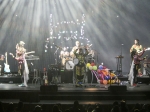




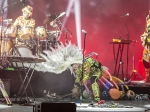


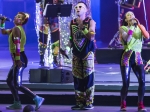
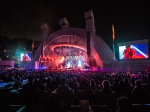







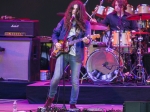

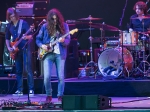
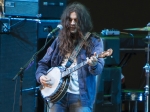

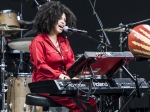
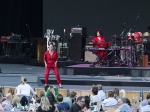

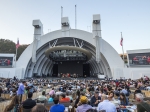





Leave a Reply